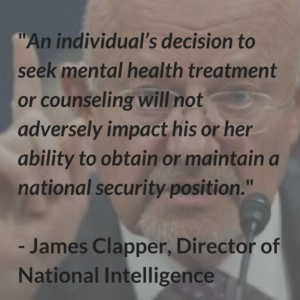INSIDE THE 
NEWS + ADVICE
Security Clearances, 2016 in Review
 2016 generated numerous headlines for issues relating to news on policy changes concerning security clearance procedures impacting security clearance holders. Let’s recap 2016’s impact on security clearances and what you can expect in 2017.
2016 generated numerous headlines for issues relating to news on policy changes concerning security clearance procedures impacting security clearance holders. Let’s recap 2016’s impact on security clearances and what you can expect in 2017.
Social Media Accounts are Open to Review in Security Clearance Determinations.
While social media allows users to connect both privately and openly to share personal opinions with a broad audience, this year Director of National Intelligence James Clapper announced a policy on the use, collection, and retention of social media information in background investigations and adjudications. The policy allows for collection of publicly-available social media information in making security clearance determinations. Notably, the policy does not allow investigators to request individuals provide passwords or access non-public social media information. In announcing the policy, officials announced their dedication to maintaining civil liberty and privacy rights. The policy also ensures that, absent a national security concern, inadvertently obtained information on other individuals will not be used.
While security clearance holders are no strangers to the government’s probing and prodding into personal information, those seeking security clearances or wishing to maintain a current security clearance should check social media privacy settings and be mindful of the content liked, shared and posted online through social media, blogs, and comments on articles.
Changes to SF 86 Mental Health Questions.
In addition to the social media initiative, Clapper also announced this year changes to Question 21 on SF 86 relating to psychological and emotional health questions. Pursuant to the new policy, applicants will no longer be asked whether they have sought mental health care. Concerning the intent of the policy change, Clapper explained, “I want to make clear that an individual’s decision to seek mental health treatment and/or counseling will not, in and of itself, adversely impact his or her ability to obtain or maintain a national security position.”
Clapper also emphasized that seeking personal wellness and recovery “demonstrates responsible behavior and may be considered favorably when evaluating a person’s eligibility for a national security position.” The focus of the SF 86 questions are now not whether an individual has received treatment, but whether the individual has a condition that may affect security clearance eligibility. These changes emphasize the government’s recognition of the importance of mental health and wellness.
The President Has the Ultimate Authority in Security Clearance Decisions.
With the 2016 presidential election, much focus was given to the executive branch’s authority in security clearances. From Hillary Clinton’s email server to rumors surrounding security clearances for the children of President-Elect Donald Trump, discussion on the process and authority in security clearance determinations were commonplace in headlines. Executive Order #12968 states the President and Vice President are not included in the uniform personnel security program for employees considered for access to classified information. Likewise, members of Congress do not go through the traditional security process review that government employees and contractors endure. Further, the president, as commander in chief and the head of the Executive Branch, has the authority to protect national security information. As part of this authority, the president can issue executive orders on security clearance issues and acts as the final authority in deciding to whom to bestow security clearances. With this power, the president is authorized to approve security clearances of individuals who might not otherwise by eligible.
Moving forward to 2017, security clearance holders can likely expect more changes due to the newly established National Background Investigations Bureau (NBIB), which absorbed the Federal Investigative Services. In September, President Obama appointed Charles S. Phalen, Jr., as the Director of the NBIB. In this role, Phalen reports to the OPM Director and leads a government-wide service provider for background investigations. Phalen has announced new initiatives that will effect those seeking or currently obtaining a security clearance. In addition to implementing newer technology initiatives, Phalen aims to cut back the security clearance decision backlog. The current wait time for security clearances range from 95 to over 200 days; however, Phalen aims to reduce the wait time to 40 to 80, which is the number of days legally required to deliver secret or top secret clearances. Phalen would also like to see agencies reestablish investigation reciprocity.
While Phalen may be replaced by the new administration, this year has demonstrated that ensuring those with access to classified and confidential information are properly vetted while balancing personal liberties remains an important national security interest.
 Caroline Leary is a senior associate at The Federal Practice Group Worldwide Service focusing in the areas of federal litigation, appellate law and security clearance.
Caroline Leary is a senior associate at The Federal Practice Group Worldwide Service focusing in the areas of federal litigation, appellate law and security clearance.

I just applied for NIW immigration.
I am planning to get a job in National Laboratory.
How can I have security clearance
Sungsook, you must be a U.S. citizen and your employer must obtain a security clearance for you. For more detail, click on the Clearance FAQs link at the bottom of this page. Good luck!